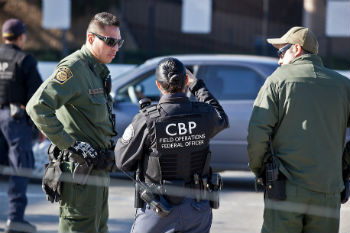US President Donald Trump’s call for a surge in new law enforcement officers to monitor the US-Mexico border as part of his immigration crackdown could inadvertently lead to greater corruption within the agencies charged with securing the border region.
In an effort to find new hires, US Customs and Border Protection (CBP) has taken to recruiting at country music festivals, sporting events and even bull-riding competitions, according to a new report by the Associated Press.
Recruiters have long struggled to fill border patrol positions, which often have remote outposts and require applicants to undergo an extensive vetting process. CBP says 75 percent of all candidates fail the agency’s standard polygraph test, the AP reported.
But President Trump’s call earlier this year for 5,000 additional border agents as part of his attempt to fortify security along the US southern border has put new strains on CBP’s hiring process. CBP estimated it could take as long as 10 years to fill those positions, according to CNN.
Trump’s plan also includes adding 10,000 Immigration and Customs Enforcement (ICE) agents, a move experts say could increase corruption within the force if proper vetting standards are not applied.
Homeland Security Secretary John Kelly has said his department will hire new agents “as fast as we can,” but added that “we will not lower standards and we will not lower training.”
InSight Crime Analysis
Despite Kelly’s assurances, the influx of new border patrol agents will likely leave CBP susceptible to greater corruption by cross-border criminal organizations. CBP is reportedly asking that local, state and federal law enforcement officers as well as military veterans be exempt from taking the polygraph test, which Congress mandated all agents take in a 2010 anti-corruption bill.
James Tomsheck, a former head of CBP internal affairs, told Mother Jones in March that waiving the polygraph test would open the door to higher levels of misconduct among border agents.
“Some of the most significant corruption cases and excessive use-of-force problems were CBP officers or Border Patrol agents who had been in the military and had served in combat,” he said.
SEE ALSO: Coverage of US-Mexico Border
The rush to hire border agents could also lead to a greater number of unprepared and inexperienced officers in the field. As NPR pointed out in February, the steep rise in CBP agents that came during the administrations of former presidents George W. Bush and Barack Obama was accompanied by expedited training regimens and fewer background checks.
Even if the normal vetting standards are upheld, the mere fact that CBP is recruiting so aggressively could make it a target of criminal groups.
“There is a concerted effort on the part of transnational criminal organizations to infiltrate, through hiring initiatives, and to compromise our existing agents and officers,” Tomsheck said in 2010 testimony before the US Senate Homeland Security subcommittee.

